Nottingham maternity crisis: Are voices finally being heard?
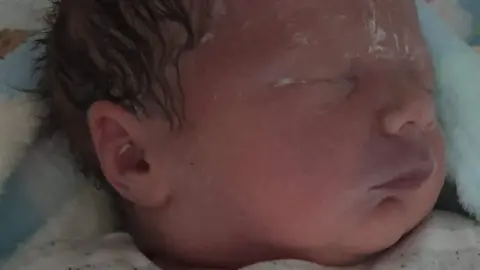 Natalie Needham
Natalie NeedhamAfter a fight lasting many months, families traumatised by poor care at Nottingham's failing maternity units received some positive news.
Senior midwife Donna Ockenden, who led the inquiry into the UK's biggest maternity scandal in Shropshire, is set to lead a review into what is going wrong at the services.
Dozens of babies have died or have been left with serious injuries at the hospitals, with more than £91m in damages and costs paid out by Nottingham University Hospitals (NUH) trust.
The BBC asked the families affected - some of whom are due to meet Ms Ockenden - if the review offers them the hope of finally having their voices heard.

'You think you are going to wake from the nightmare'
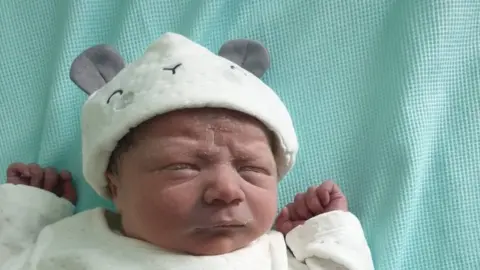 Natalie Needham
Natalie NeedhamNatalie Needham's son Kouper died in July 2019 in a Moses basket in the family living room when he was just 24 hours old.
When he was discharged from Nottingham City Hospital, about 14 hours after he had arrived in the world in July 2019, Natalie said she had concerns.
"He wasn't feeding," she said.
"He did cry but very minimal and after that he never really moved. He was blue. He seemed very lifeless, like he was unconscious."
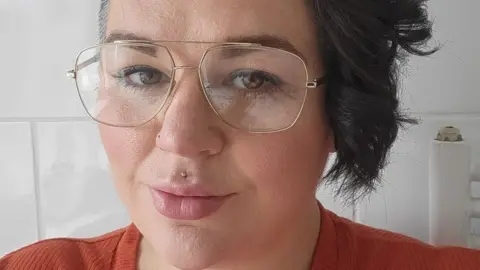 Natalie Needham
Natalie NeedhamNatalie said she and her husband Dave spoke to four different midwives to try to raise their concerns.
"We couldn't get him to breastfeed, syringe feed [or] bottle feed," she said.
"We raised the alarm quite a few times with various midwives.
"They just gave us other options to feed him but nobody followed through or came to check why he wasn't feeding."
Natalie believes her concerns were dismissed because she had four older children.
"It was as if they said 'You're a competent mum; we'll let you get on with it' instead of thinking 'This is her fifth child and she's expressing concerns'.
"It should have set alarm bells ringing," she said.
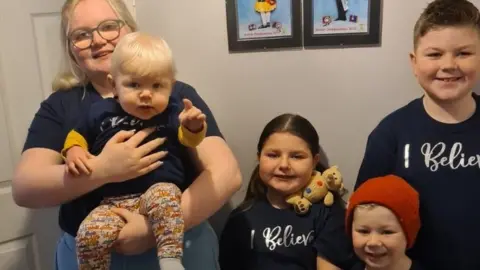 Natalie Needham
Natalie NeedhamAt home that afternoon, the family welcomed the new baby.
However during the early hours of the morning, Dave discovered Kouper was not breathing.
"I just remember running down the stairs thinking, come on, we can do this, he'll be fine," Natalie said.
"We rang an ambulance; we did CPR. Dave tried to keep the kids out of the way so they didn't see too much but they wanted to be with him.
"My eldest sat with him and held his hand while we did CPR, telling him it was going to be OK and we loved him.
"You just think you're going to wake up from that nightmare and somebody is going to tell you it was a dream."
An inquest concluded Kouper had died of respiratory distress.
Natalie said: "Even with the correct care we can't say the outcome would have been different, but he was never given a chance.
"We can't say he would have lived or he wouldn't have lived but he was failed on the fact that no-one listened to our concerns."
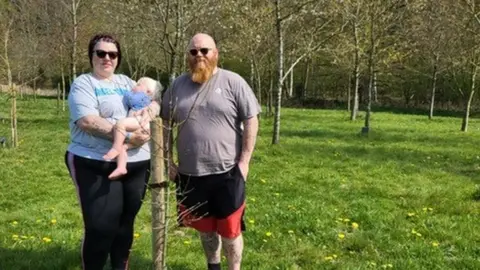 Natalie Needham
Natalie NeedhamShe said the naming of Donna Ockenden represented a major milestone for herself and other families, who felt they were ignored during their births and subsequently.
"We are still apprehensive; we still don't know what her plans are but as a whole, the families are ready to let go of the reins and give her the opportunity to do it justice," she said.
"We all feel now we are getting the chance to have our concerns listened to. We feel it's going in the right direction."

'People have got to start listening to women'
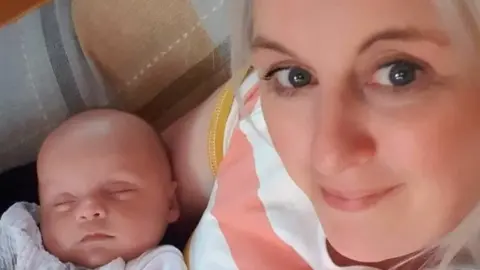 Michelle Welsh
Michelle WelshMichelle Welsh, from Arnold, had a complicated pregnancy, due to a condition called a heart-shaped womb.
Under advice from her consultant, she booked a planned Caesarean section.
Her consultant told her that if she went into labour, she needed to get straight to hospital and left notes on her file to specify this.
But when labour began and Michelle called Nottingham City Hospital's maternity unit, she said the midwife told her she did not have time to check her file and she would not be admitted.
"I was a bit taken aback," said Michelle. "I felt stupid."
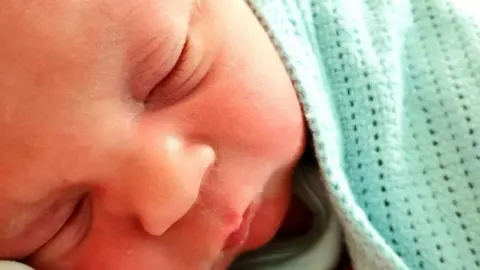 Michelle Welsh
Michelle WelshEventually, she was admitted to the hospital but, by that point, she said she felt "really, really scared".
"My waters [had] broken which my consultant said would be dangerous for me and dangerous for the baby. My baby could not be born naturally," she said.
"The first thing the midwife said to me was 'why did you leave it so long? Why didn't you come in earlier?'" she said.
The hospital staff began trying to check the baby's heartbeat.
"The first machine that they got out didn't work. The second machine they got out didn't work," said Michelle.
The third machine worked, but the sticky pads didn't work so they had to get some plasters and then they couldn't find my baby's heartbeat.
"So I was lying there not knowing whether my baby was alive or not."
 Michelle Welsh
Michelle WelshMichelle said the hospital consultant did not interact with her in any meaningful way.
"It was like I'd done something wrong," she said.
Initially, Michelle said she was told the Caesarean would be performed the following morning - but she could see her baby's heartrate "dramatically dropping" on the monitor.
"The midwife said 'I don't feel comfortable with this. I'm going to go in and get the consultant back'" she said.
"The consultant re-entered the room begrudgingly and said we are going to have to do an emergency C-section as soon as possible.
"So I did end up having an emergency C-section, all of it totally avoidable."
 Michelle Welsh
Michelle WelshWhen she heard her baby boy William unleash an "almighty cry", Michelle felt massively relieved.
"I was really traumatised and I was obviously heavily drugged up. My baby was put in the cot beside me," she said.
She said she was told the baby would be checked every 10 minutes. Michelle drifted off to sleep - she believes for about an hour-and-a-half.
"When I woke up I turned to look at my baby and take a picture of him and he was covered in his own vomit," she said.
"I don't think they had checked on us as often as they said they would."
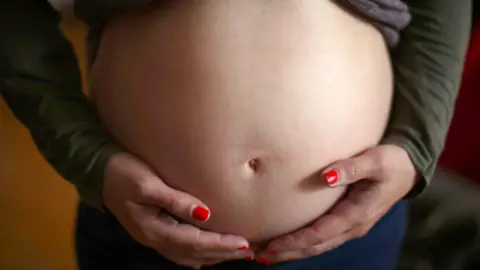 PA Media
PA MediaToday William - known as Billy - is two years old.
"I am lucky," said Michelle, who is a Labour councillor for Nottinghamshire, and sits on the health scrutiny committee.
"I've come out of the hospital with my baby boy and he's my absolute world and I love him to bits but every now and again I think how it could have been so different."
She said she believed putting Donna Ockenden in charge had given families hope for the first time.
"There's light at the end of the tunnel," she said.
"I know there are still poor practices going on. My worry is NUH think her arrival means things are resolved and they are not.
"I'm also concerned the trust won't listen to what she says. That's why it's really important the government needs to be there to back Donna Ockenden up.
"People have got to start listening to women, because a woman knows their body.
"While they might not know every single medical fact going, all the families that I have spoken to expressed concerns to healthcare professionals that something was not right and it was dismissed.
"That cannot go on."

'Beacon of light'
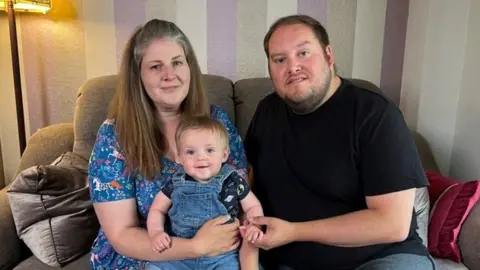 Bhasker Solanki
Bhasker SolankiSarah and Gary Andrews' daughter, Wynter, died 23 minutes after being born on 15 September 2019 at the city's Queen's Medical Centre.
The couple have told the BBC they remain "very concerned" problems remain years later.
They were speaking in the wake of a Care Quality Commission (CQC) report which said significant improvements must be made at the city's maternity units.
Sarah said: "We feel it's concerning there are still such problems going on."
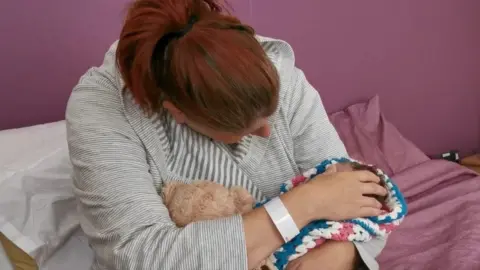 Sarah Andrews
Sarah AndrewsShe added she was "delighted" Donna Ockenden had been appointed to lead the review in Nottingham.
"We feel it's something that has been much-needed. Families need to have confidence in the review, and it needs to make real and meaningful changes going forwards," she said.
An original review, which has published its interim report, had faced sustained criticism from families and campaigners over its remit and independence.
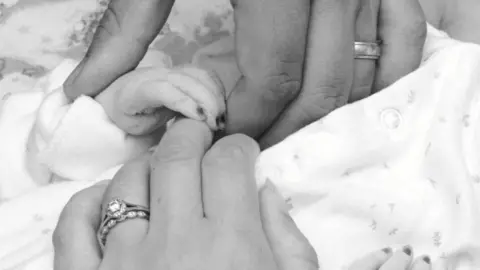 Sarah Andrews
Sarah AndrewsGary said Ms Ockenden's appointment was a "beacon of light".
"It was apparent that the review that we did have, it was widely accepted that it wasn't fit for purpose, it was woefully inadequate," he said.
"She [Donna Ockenden] comes with the respect of kind of a network of bereaved families, in Shrewsbury and Telford, and she's truly independent."

NUH said many improvements had been made to the service that were making a difference to care.
They said these included the introduction of a round-the-clock maternity advice line, the recruitment of additional staff and the separation of emergency and routine assessments at both hospitals.
Director of midwifery Sharon Wallis said: "Our aim is to offer the best maternity care to the families using our services, and to do this we are committed to supporting the review team's work, which alongside the work of our own improvement team will ensure we do everything necessary to learn and improve."

Follow BBC East Midlands on Facebook, on Twitter, or on Instagram. Send your story ideas to eastmidsnews@bbc.co.uk.
